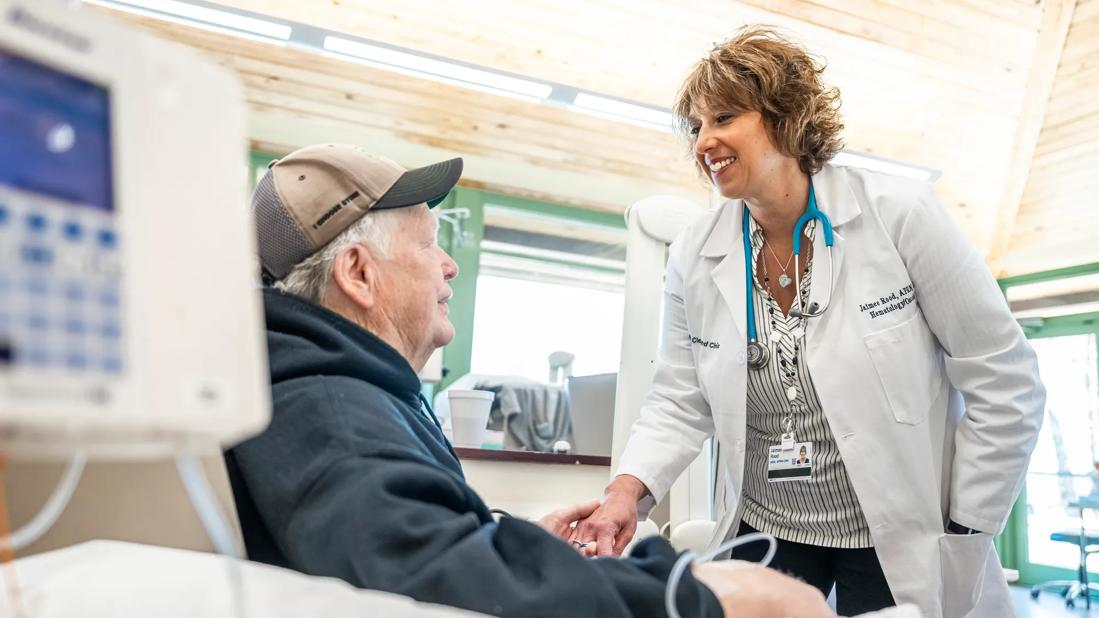
Image content: This image is available to view online.
View image online (https://assets.clevelandclinic.org/transform/a3d56a66-4a6e-4538-88a6-5722ffbec5b3/CNR_5826958_03-26-25_024_MLC)
Nurse with cancer patient
May is Oncology Nursing Month and it’s a great time to celebrate oncology nurses for their incredible dedication and the compassionate and committed care they provide patients and families.
Advertisement
Cleveland Clinic is a non-profit academic medical center. Advertising on our site helps support our mission. We do not endorse non-Cleveland Clinic products or services. Policy
Cleveland Clinic’s Cancer Center/Taussig Cancer Institute employs more than 700 physicians, researchers, nurses and technicians throughout Cleveland Clinic health system. Oncology nurses at Cleveland Clinic care for thousands of patients each year, working in both inpatient and outpatient settings.
Crystal Johnson, RN, OCN, is an oncology nurse on the G70 nursing unit at Cleveland Clinic main campus – the largest inpatient cancer unit at Cleveland Clinic with 36 patient beds and 74 nursing caregivers. Johnson’s G70 unit is a solid tumor oncology unit and is where the vast majority of admitted cancer patients receive care. Patients with blood or bone marrow cancers that are not classified as solid tumors are seen on other nursing units.
“Patients come to G70 for various reasons,” Johnson says. “We care for patients who have symptom control or management needs, patients who require inpatient chemotherapy infusions and more.”
Johnson and most of her unit nurse colleagues work 12-hour shifts. She typically cares for 3-4 patients per shift, performing duties such as medication administration and assisting patients to and from necessary lab tests and procedures. She says the oncology nurses on her unit constantly communicate with all caregivers on a patient’s team – residents, physicians, physical therapists, case managers, social workers, pharmacists, etc. They work closely with surgical and palliative medicine teams. And, they continually provide input and advocate on a patient’s behalf to ensure the most appropriate care plans, address potential home, financial or social issues, and more.
Advertisement
In Johnson’s words, “Oncology nurses are like the quarterback for the patient.”
She adds, “In oncology nursing, you are treating the entire person – not just the disease. You are caring for the patient as a whole, so we work closely with a multi-disciplinary team and follow a very streamlined, team-based approach to care.”
Cleveland Clinic Cancer Center is known for its multi-disciplinary cancer programs, which are organized by disease, and united treatment discipline approach.
“At Cleveland Clinic, oncology nurses have the opportunity to work with some of the most intelligent physicians in healthcare,” Johnson comments. “And, they have a great amount of respect for our nurses and PCNAs (patient care nursing assistants) – we always feel like we are pivotal to the team.”
The oncology specialty has a reputation as one of the more challenging nursing career paths. Not only are nurses needed to support patients, families and caregivers through the stress of cancer diagnosis and treatment, they are also leaned on heavily for the many uncertainties that accompany the disease.
“Taking care of an oncology patient is so different than caring for other patients. I think it takes another level of patience, empathy and compassion,” Johnson adds.
Johnson admits that oncology nursing isn’t for everyone, citing that many who choose the field have often been touched by cancer in some way. Personally, she made the decision to become an oncology nurse because her grandmother passed away from lung cancer.
Advertisement
“You don’t choose oncology nursing, oncology nursing choses you,” Johnson says.
She continues: “It’s not for the faint of heart, but it’s one of the most rewarding things I’ve ever been a part of. There’s a tremendous level of vulnerability patients feel just in the fact that this is even happening to them. Helping them during this vulnerable time is really humbling and makes you appreciate all that you have in your life. Caring for cancer patients is an honored privilege.”
Johnson says oncology nursing often gets a bad rap for being sad or depressing and while there are those moments, she stresses that there are also many moments of joy and celebration.
“Oncology nurses go to battle and fight alongside their patients, celebrating our patients’ milestones when things are positive, but we’re also able to have those hard conversations and provide comfort when patients need it most,” she adds. “Every profession in nursing requires compassionate care, but I think anyone who has encountered an oncology nurse sees that there’s something special about them. It requires more to be able to celebrate the victories and then turn around and hold someone’s hand when they are taking their last breath.”
Although cancer is the second leading cause of death next to heart disease, according to the American Cancer Society, the oncology field is vastly different today than it once was. With more treatment options, better pain control and reduced treatment side effects, cancer care continues to innovate and evolve.
Advertisement
For those considering a career in oncology nursing, this specialty is sure to offer lifelong learning, endless opportunities and ongoing professional growth.
Join Cleveland Clinic in honoring, thanking and celebrating oncology nurses during Oncology Nursing Month. Happy Year of the Nurse!
*Don’t miss your chance to participate in Cleveland Clinic’s VeloSano ‘bike to cure’ event, in which 100 percent of funds raised go to cancer research at Cleveland Clinic. VeloSano will be held virtually this year, July 17-19.
Advertisement
Advertisement
Regional organizations collaborate to address nurse faculty shortage
How wellness habits help nurses flourish
Planning continues with critical, patient-focused input from nursing teams
Strengthening care through targeted resources and frontline voices
Embracing generational differences to create strong nursing teams
CRNA careers offer challenge and reward
An unexpected health scare provides a potent reminder of what patients need most from their caregivers
Cleveland Clinic Abu Dhabi initiative reduces ICU admissions and strengthens caregiver collaboration